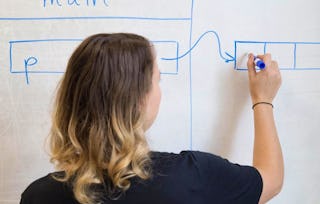The third course in the specialization Introduction to Programming in C introduces the programming constructs pointers, arrays, and recursion. Pointers provide control and flexibility when programming in C by giving you a way to refer to the location of other data. Arrays provide a way to bundle data by guaranteeing sequences of data are grouped together. Finally, recursive functions—functions that call themselves—provide an alternative to iteration that are very useful for implementing certain algorithms.

Pointers, Arrays, and Recursion

Pointers, Arrays, and Recursion
This course is part of Introductory C Programming Specialization



Instructors: Andrew D. Hilton
45,790 already enrolled
Included with
349 reviews
Skills you'll gain
Details to know

Add to your LinkedIn profile
7 assignments
See how employees at top companies are mastering in-demand skills

Build your subject-matter expertise
- Learn new concepts from industry experts
- Gain a foundational understanding of a subject or tool
- Develop job-relevant skills with hands-on projects
- Earn a shareable career certificate

There are 5 modules in this course
Pointers are one of the most important and powerful aspects of the C language. Pointers are critical to understanding arrays, which let you manipulate sequences of data. They also give a programmer control and flexibility when programming, enabling solutions that are clean and efficient. Some other languages use pointers implicitly—or pointer-like constructs—so understanding their use will make you a better programmer in any language.
What's included
5 videos14 readings3 assignments2 programming assignments
Arrays are sequences of memory of the same type that are guaranteed to be one after another. This is an incredibly useful data format, enabling you to store many things together under one variable name. In this module, you will learn how to use arrays to solve more complex problems and lay the groundwork for more complex data types.
What's included
5 videos7 readings1 assignment4 programming assignments
Now that you have mastered the basics of pointers and arrays, it is time to see some important uses of them. In this module, you will learn about how to manipulate strings and multi-dimensional arrays. You will also learn about function pointers, which allow you to pass "which function to call" as the parameter of another function.
What's included
4 videos16 readings2 assignments4 programming assignments
By now you are familiar with iteration, in which repetition is expressed in terms of loops. Another programming technique to accomplish similar ideas is "recursion" in which a more complex instance of a problem is expressed in terms of solutions to simpler instances of the problem. In this module, you will learn how to read and write recursive code, giving you another powerful option for how to approach programming problems.
What's included
9 videos8 readings1 assignment3 programming assignments
Now that you have learned about pointers and arrays, you will build on the code you wrote in Course 2 to build a deck of cards and evaluate a poker hand. In the next course, you will complete the program to calculate poker odds with a Monte Carlo simulation.
What's included
4 readings2 programming assignments
Earn a career certificate
Add this credential to your LinkedIn profile, resume, or CV. Share it on social media and in your performance review.
Instructors


Offered by
Explore more from Software Development

Duke University

Duke University

Duke University
Why people choose Coursera for their career

Felipe M.

Jennifer J.

Larry W.

Chaitanya A.
Learner reviews
- 5 stars
65.04%
- 4 stars
19.48%
- 3 stars
5.73%
- 2 stars
2.57%
- 1 star
7.16%
Showing 3 of 349
Reviewed on Oct 19, 2020
Great introductory course for those who want to learn primitive part of programing.
Reviewed on Dec 20, 2019
Teaches you how to use GDB and debug code effectively. Challenging and engaging homework.
Reviewed on Jun 3, 2020
excellent foundation-building course, not an easy one though

Open new doors with Coursera Plus
Unlimited access to 10,000+ world-class courses, hands-on projects, and job-ready certificate programs - all included in your subscription
Advance your career with an online degree
Earn a degree from world-class universities - 100% online
Join over 3,400 global companies that choose Coursera for Business
Upskill your employees to excel in the digital economy
Frequently asked questions
No. Completion of a Coursera course does not earn you academic credit from Duke; therefore, Duke is not able to provide you with a university transcript. However, your electronic Certificate will be added to your Accomplishments page - from there, you can print your Certificate or add it to your LinkedIn profile.
To access the course materials, assignments and to earn a Certificate, you will need to purchase the Certificate experience when you enroll in a course. You can try a Free Trial instead, or apply for Financial Aid. The course may offer 'Full Course, No Certificate' instead. This option lets you see all course materials, submit required assessments, and get a final grade. This also means that you will not be able to purchase a Certificate experience.
When you enroll in the course, you get access to all of the courses in the Specialization, and you earn a certificate when you complete the work. Your electronic Certificate will be added to your Accomplishments page - from there, you can print your Certificate or add it to your LinkedIn profile.
More questions
Financial aid available,

